Production gaps drain profits. Weak processes slow growth. This is never wrong, especially for manufacturing businesses that are facing high risks in the final outcome. The ideal technology and software play a decisive, vital role for businesses to continue to be motivated to grow. According to the New Industrial Master Plan 2030, by 2030, the manufacturing GDP in Malaysia is expected to reach RM587.5 billion thanks to automation and digital transformation. However, it is not really a rosy picture!
McKinsey sources have confirmed that 70% of digital transformation initiatives face failure due to mistakes in choosing and implementing poor and inappropriate software systems. This means, even if you apply digital and manufacturing technology, if it does not meet the needs and does not match the available system, everything is zero.
To choose the ideal manufacturing ERP software, you not only need to understand the strengths and weaknesses of your current business and the desired system you will use, but also to have a comprehensive view of the ERP manufacturing software world with features specific to the manufacturing process in Malaysia. Understanding the key features, strong, and weak points of each one is a stepping stone for you to be able to make the right and ideal choice for your business.
Dive deep into our article to choose wisely, because growth depends on your choice.
Crucial Guidelines to Choose The Ideal Manufacturing ERP Software
The ideal manufacturing ERP software should be a core tool that increases manufacturing efficiency, enhances decision-making, and scales to meet the needs of the business over time. Every feature, function, and integration should match the complexity of manufacturing processes.
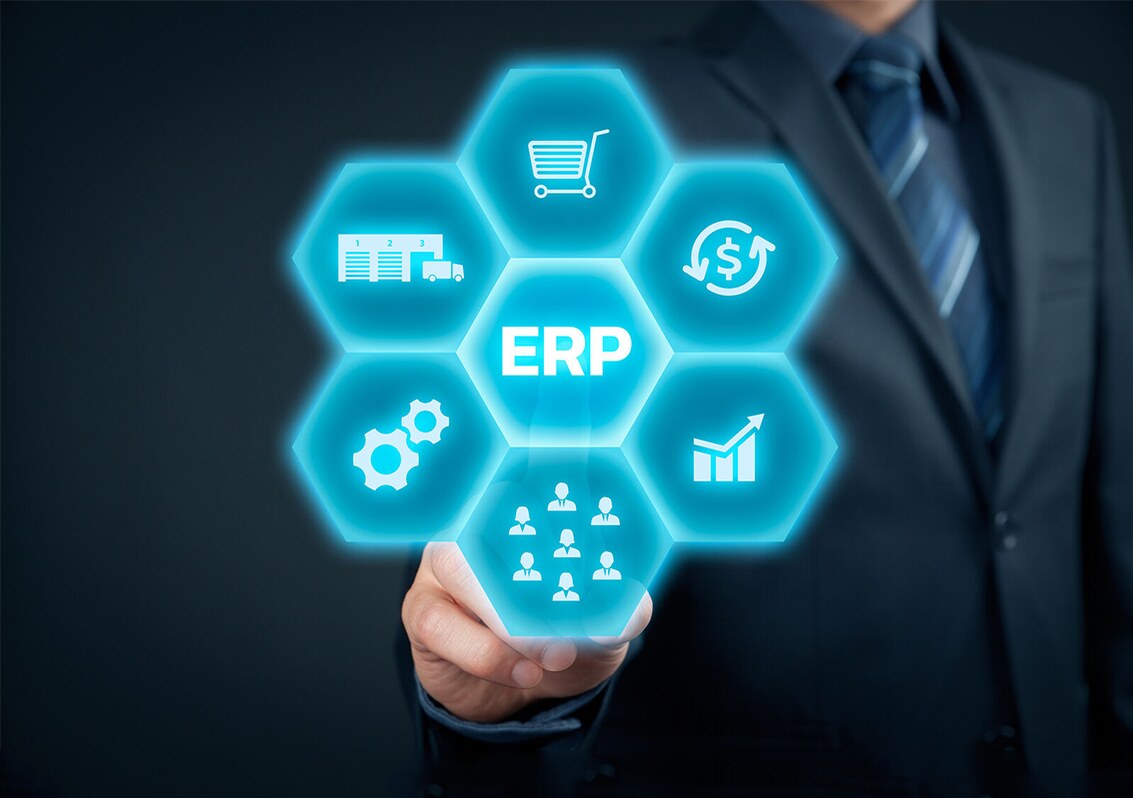
Some key criteria that an ideal manufacturing ERP software should have are listed by our team of experts below:
Industry-specific capabilities
Manufacturing runs on precision. A standard manufacturing ERP software cannot lack important functions such as Bill of Materials (BOM), Master Production Scheduling (MPS), and shop floor execution. Without them, your manufacturing company will face production delays, inventory imbalances, and obvious limitations in management processes.
The system should also excel in raw material tracking, work order automation, and quality control monitoring to maintain steady growth in operations.
Seamless system integration
Software that is difficult to connect will disrupt efficiency. A good manufacturing ERP software should unify inventory management, procurement, sales, and finance processes to eliminate bottlenecks. Real-time integration with IoT devices, barcode scanners, and third-party logistics (3PL) solutions completely eliminates data fragmentation. Process interruptions, technical errors, and increased operating costs will also be eliminated.
Real-time data accuracy
A robust manufacturing ERP software will help your staff grasp live data on manufacturing cycles, inventory levels, and supply chain movements. Instant access to real-time dashboards is a lever to confirm that overproduction or unexpected stockouts will rarely occur.
In addition, Malaysian manufacturers also rely on timely reports to quickly make necessary decisions and responses, enhancing their competitive advantage.
Advanced automation & AI
The age of AI is here, and you don't want your manufacturing ERP software to be one step behind the global one. Therefore, the ideal manufacturing ERP software needs to be ready for the advent of AI to detect bottlenecks, predict demand, dynamically automate procurement, and automatically schedule resources. Without automation, your team will be frustrated by repetitive tasks, operational delays, and rising labor costs.
Regulatory & compliance readiness
Non-compliance leads to legal risks. Your manufacturing ERP software must comply with distinct tax laws, e-invoicing requirements, and safety regulations specific to the Malaysian manufacturing industry.
Automated tracking and compliance ensures audit readiness, maintains reporting accuracy, and prevents financial penalties. Non-compliant manufacturing processes risk shutdowns, loss of quality certifications, and supply chain disruptions – you know that already.
User experience & accessibility
Complex interfaces slow down adoption in the manufacturing process. An intuitive manufacturing ERP simplifies navigation, speeds up employee training, and reduces user errors. What’s more, a mobile-friendly platform allows supervisors to track manufacturing status, approve workflows from anywhere, and analyze reports from anywhere.
Vendor expertise & support
The ideal manufacturing ERP software can still fall short of delivering stellar performance if you partner with a weak vendor. Local expertise in Malaysia manufacturing standards, industry-specific challenges, and compliance laws strengthens implementation. Dedicated support teams with expertise will resolve system errors, conduct performance tuning, and provide on-demand troubleshooting services. You don’t need a lot of technical knowledge or expertise, either!
Choosing the ERP vendors also plays a vital role in your success.
You should also read this article: Top 15 Inventory System Malaysia for Streamlined Operation: Explore Now!
10 Best Manufacturing ERP Software in Malaysia For Your Business
Odoo
Odoo Manufacturing is a Malaysia manufacturing ERP software that stands out when it comes to synchronizing manufacturing with real-time intelligence. Its modular architecture unifies manufacturing, inventory, and sales into a single, high-performance system. Its scalability turns small operations into data-driven enterprises.
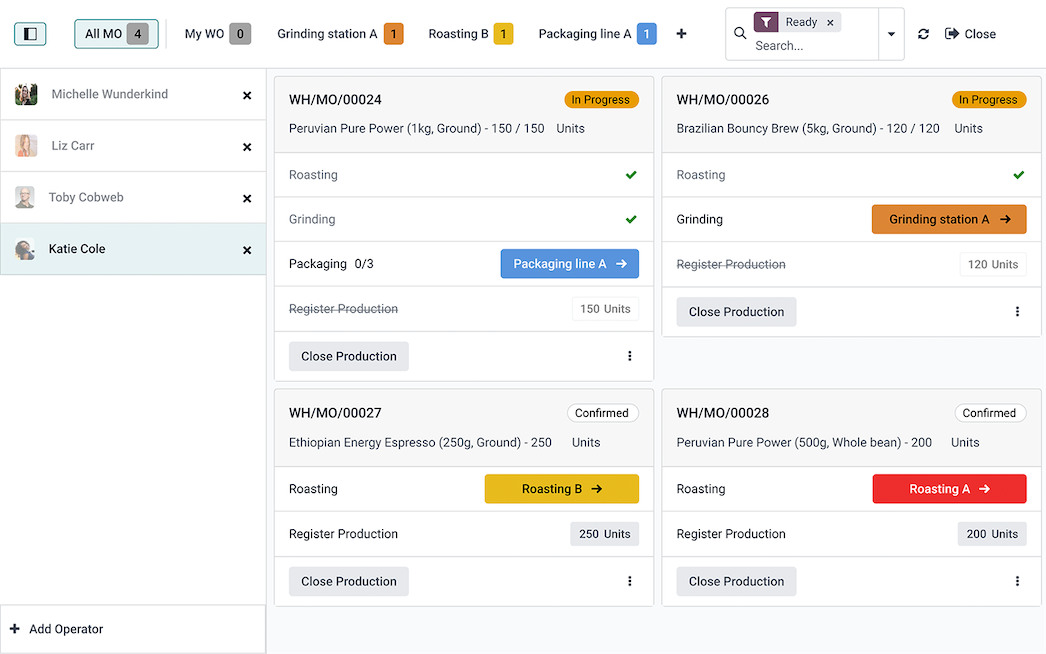
Key features
- Integrated MRP: Automates work orders, demand planning, and production scheduling.
- Real-time inventory control: Tracks raw materials, finished goods, and stock movements with live data.
- Advanced BOM management: Structures multi-level BOMs with routing and cost calculations.
- Shop floor automation: Connects IoT devices, barcode scanners, and machine sensors for live tracking.
- Dynamic reporting & forecasting: Provides AI-powered insights on cost efficiency, production trends, and performance metrics.
- Cloud-based & on-premise deployment: Adapts to business scalability, compliance requirements, and IT infrastructure.
- Multi-company & multi-warehouse management: Unifies multiple sites, distribution centers, and subsidiaries in a central system.
- Seamless ERP integration: Connects accounting, HR, procurement, and CRM modules for operational cohesion.
Pros and cons
Pros | Cons |
|
|
Best for
Odoo strengthens small-to-medium Malaysia manufacturers transitioning from manual processes to ERP automation. Fast-growing businesses in discrete manufacturing, food production, and automotive industries stand to gain tremendous potential and stay competitive with the agility of Odoo.
Acumatica
Manufacturers demand tight control, flexibility, and precision from their manufacturing ERP software. Acumatica delivers on all counts! This ERP software manufacturing delivers a cloud-powered ERP with deep manufacturing intelligence. Every process is seamlessly connected—manufacturing, supply chain, finance, and inventory. Data moves in real time, making decisions sharp and operations synchronized.
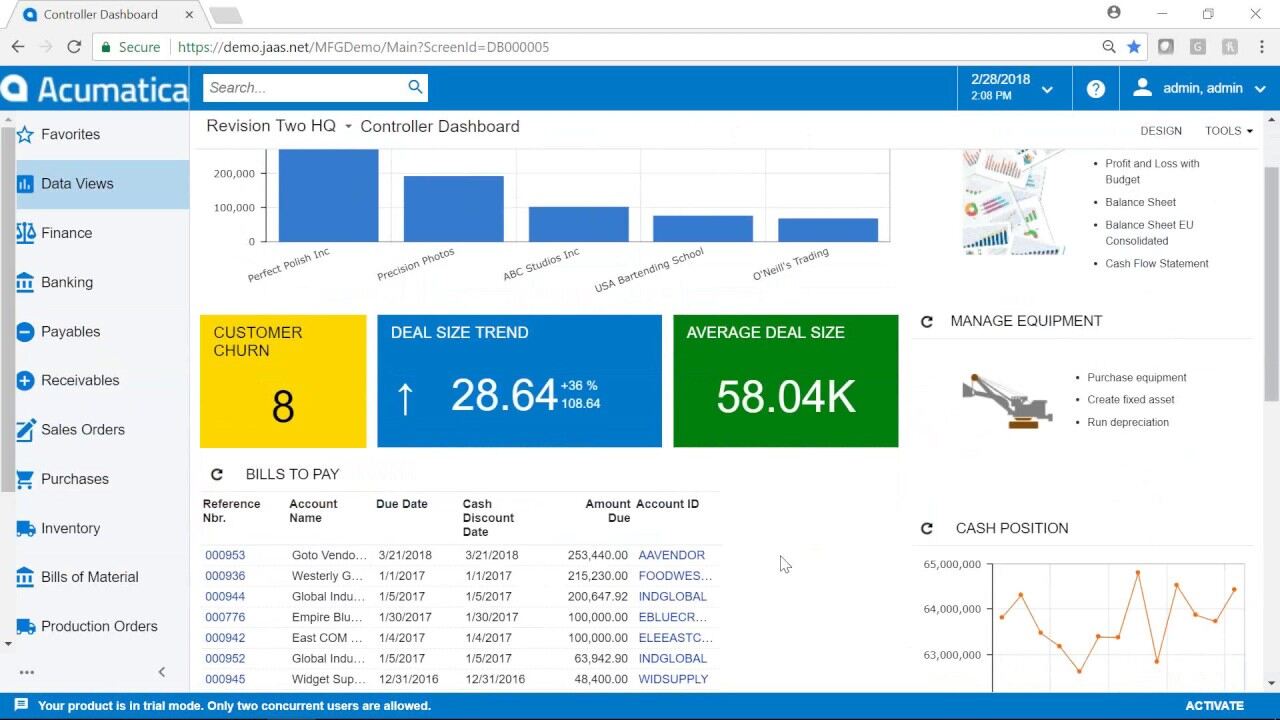
Key features
- Cloud-based architecture: Delivers real-time, remote access with full SaaS scalability.
- Advanced production management: Structures bill of materials (BOM), work orders, and job scheduling with accuracy.
- Integrated supply chain control: Aligns procurement, vendor tracking, and demand forecasting.
- Smart inventory optimization: Tracks materials, warehouse movements, and stock levels dynamically.
- Seamless accounting integration: Connects financials, cost control, and order processing into a single platform.
- Industry-specific customization: Adapts to unique manufacturing workflows with modular extensions.
Pros and cons
Pros | Cons |
|
|
Best for
Acumatica is ideal manufacturing ERP software for small and midsize manufacturers with 25-200 employees. Businesses in industrial machinery, metal fabrication, and consumer goods manufacturing can easily scale efficiently with cloud-based automation features from this ERP software for the manufacturing industry.
Netsuite
Netsuite is a prominent manufacturing ERP software in Malaysia that transforms the entire manufacturing process into a unified, cloud-driven ecosystem. Its end-to-end ERP framework synchronizes production, supply chain, and financial control with global precision. Large-scale enterprises achieve operational dominance with real-time analytics and multi-entity control.
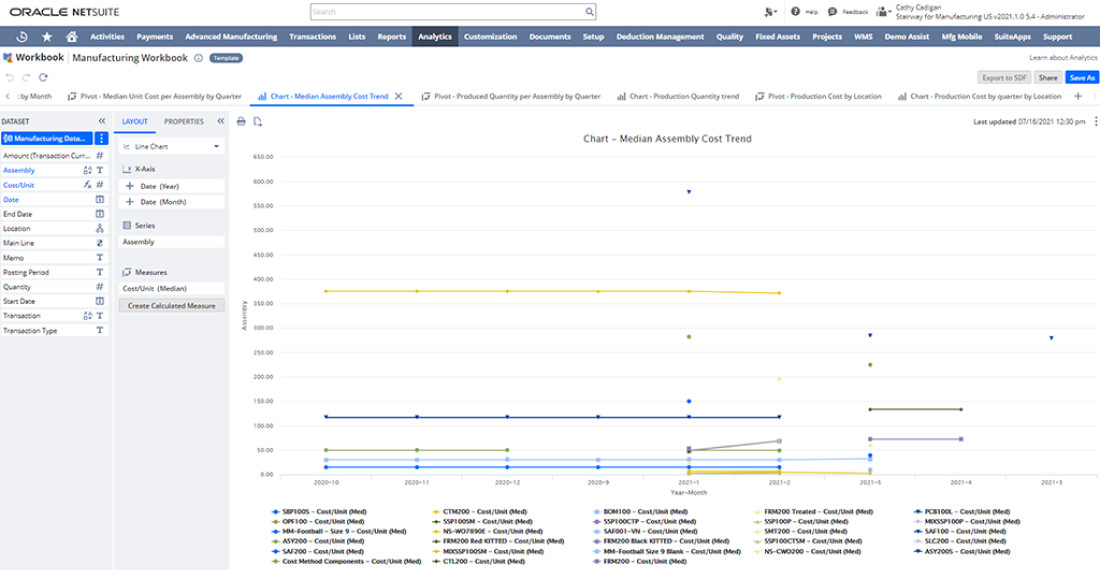
Key features
- Cloud-based ERP: Centralizes manufacturing, inventory, and financials in a seamless, web-powered platform.
- Production management: Manages work orders, scheduling, and demand planning with automated workflows.
- Supply chain intelligence: Tracks supplier performance, procurement cycles, and inventory levels with predictive insights.
- Multi-entity & multi-currency support: Standardizes global operations across subsidiaries, currencies, and tax regulations.
- Advanced order management: Controls sales orders, fulfillment, and invoicing through a single, integrated system.
- Warehouse & logistics optimization: Enhances stock accuracy, order routing, and distribution networks with real-time data.
- Financial planning & compliance: Strengthens budgeting, cash flow tracking, and regulatory alignment with built-in analytics.
- Mobile ERP accessibility: Extends full ERP functionality to mobile devices for on-the-go decision-making.
Pros and cons
Pros | Cons |
|
|
Best for
NetSuite drives efficiency in mid-sized and large-scale Malaysian manufacturers managing multi-location, multi-currency, and global supply chains. High-growth businesses in Malaysia with expansion potential such as electronics, pharmaceuticals, and automotive manufacturing benefit from the solution's advanced financial controls and real-time production insights.
SAP Business One
SAP Business One, as a manufacturing ERP software, redefines manufacturing control with a structured, process-driven framework. Malaysian manufacturing SMEs gain unified visibility across manufacturing, inventory, and financial operations. Complex workflows are transformed into simple, automated sequences with real-time insights.
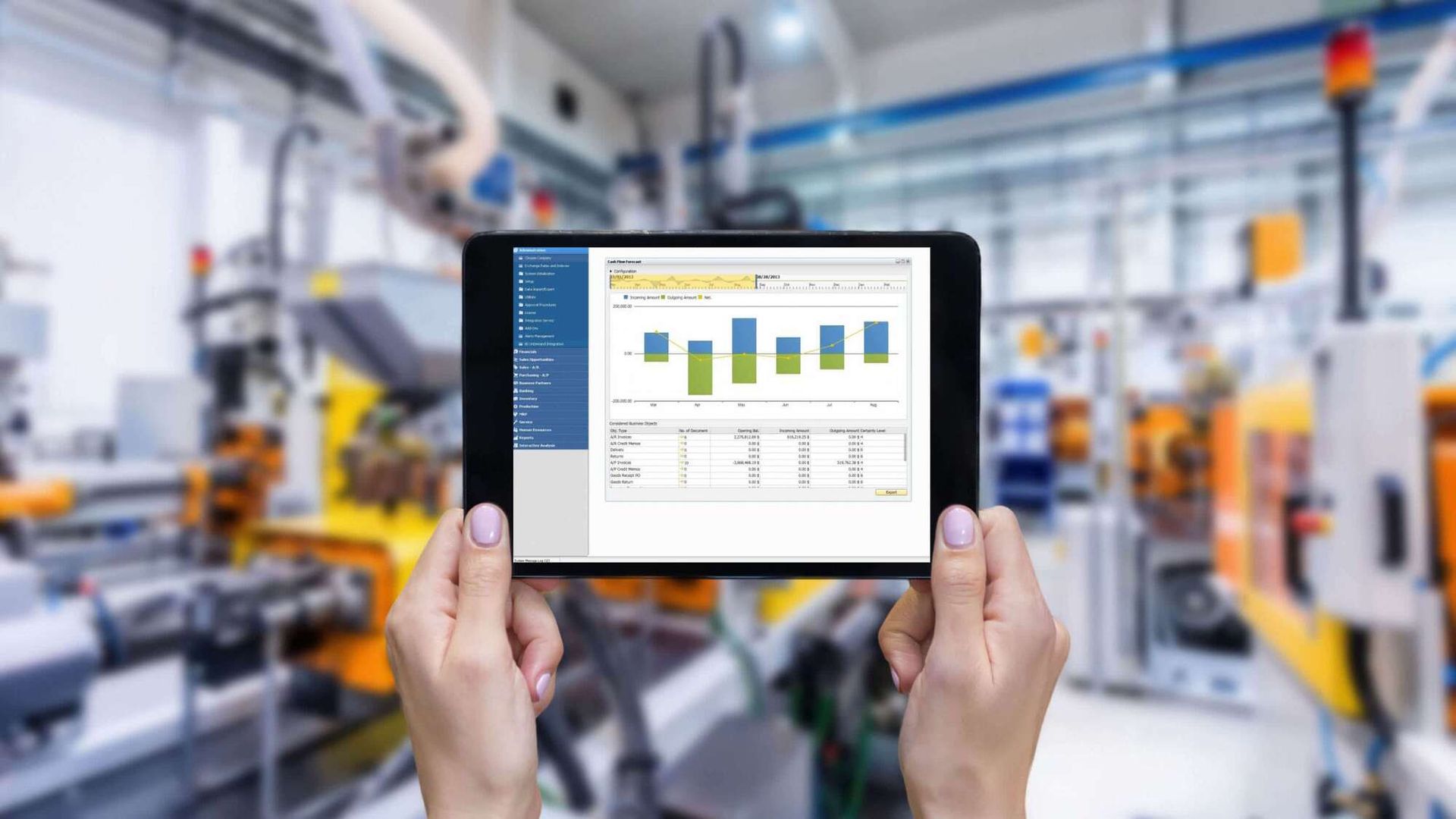
Key features
- Integrated production management: Orchestrates work orders, material planning, and capacity scheduling with structured automation.
- Multi-level Bill of Materials (BOM): Structures assembly processes with layered component tracking and cost breakdowns.
- Real-time inventory control: Tracks raw materials, stock movements, and order fulfillment with precision monitoring.
- Procurement & purchase automation: Standardizes supplier management, order requests, and replenishment cycles.
- Advanced financial reporting: Aligns cost accounting, cash flow management, and tax compliance in a centralized system.
- End-to-end business analytics: Delivers custom reports, KPI dashboards, and trend analysis with predictive intelligence.
- Discrete & process manufacturing support: Accommodates complex assembly lines and formula-based production models.
Pros and cons
Pros | Cons |
|
|
Best for
SAP Business One supports small and medium-sized Malaysian manufacturers managing 50-300 employees. Businesses spanning structured manufacturing, financial control, and inventory automation, in addition to the electronics, retail, and automation industries gain from its generated process framework.
Microsoft Dynamic 365 Business Central
Microsoft Dynamic 365 Business Central connects manufacturing operations with intelligent, cloud-driven precision. Mid-sized enterprises gain structured automation across production, finance, and supply chain processes. Quickly transform complex workflows into scalable, modular systems with deep analytics.
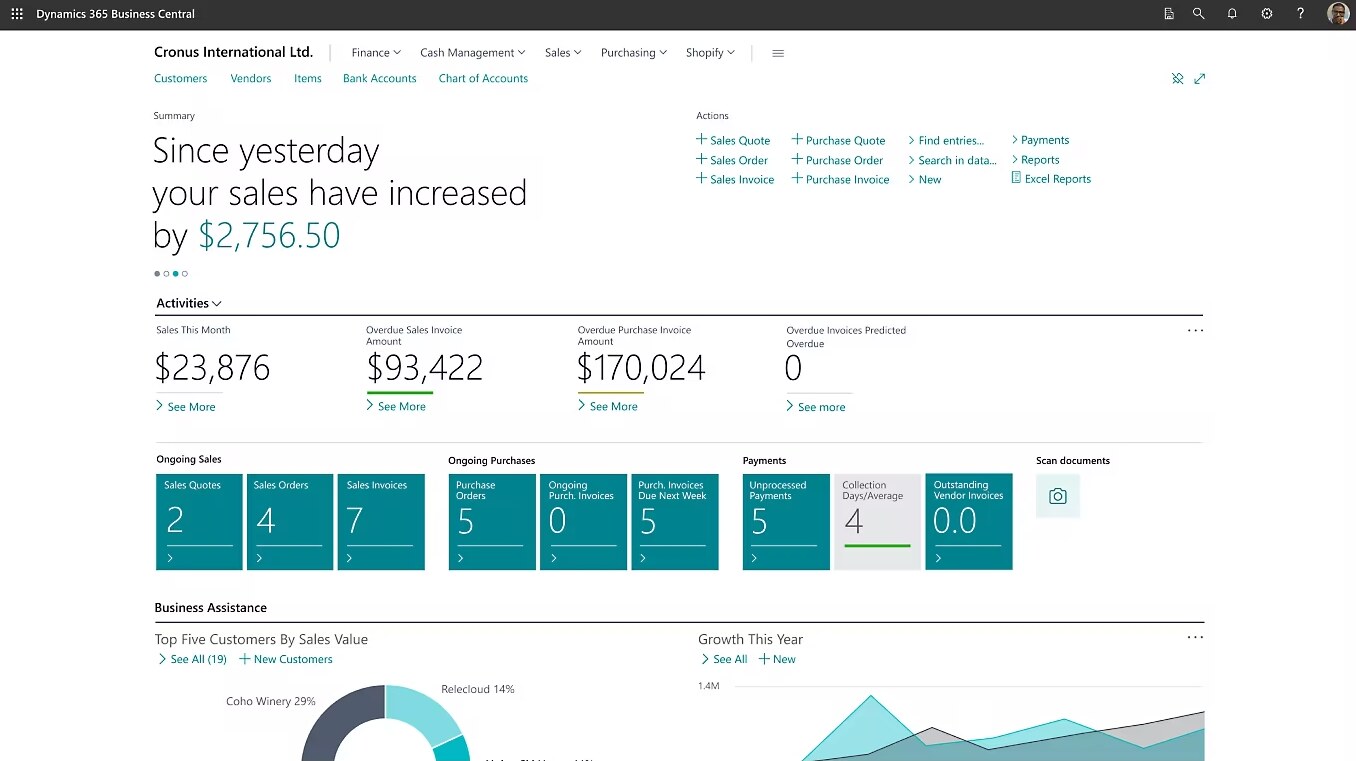
Key features
- Production planning & scheduling: Organizes material allocation, job sequencing, and capacity planning with structured automation.
- Advanced inventory management: Tracks raw materials, work-in-progress, and finished goods in real time.
- Integrated supply chain control: Synchronizes procurement, logistics, and supplier collaboration into a single framework.
- Financial & cost management: Structures cost accounting, cash flow tracking, and profitability analysis with precision.
- Business intelligence & analytics: Powers custom reports, real-time dashboards, and AI-driven forecasts.
- Scalable cloud architecture: Supports on-premise, hybrid, and full-cloud deployment for enterprise flexibility.
- Seamless Microsoft integration: Connects Power BI, Azure, and Microsoft 365 for unified business processes.
Pros and cons
Pros | Cons |
|
|
Best for
Microsoft Dynamics 365 Business Central fully supports medium and large sized Malaysian manufacturers, managing 50-500 employees. Companies in the automotive or industrial equipment manufacturing industries benefit from well-structured automation and cloud-driven scalability.
Epicor Kinetic
Manufacturers face complexity at every stage – but not with Epicor Kinetic as a manufacturing ERP software. Every function is tailored to real-world manufacturing needs. Combined with a cloud-based architecture and the ability to scale with precision, this system helps Malaysian businesses produce flexibly and increase their competitiveness in the market.
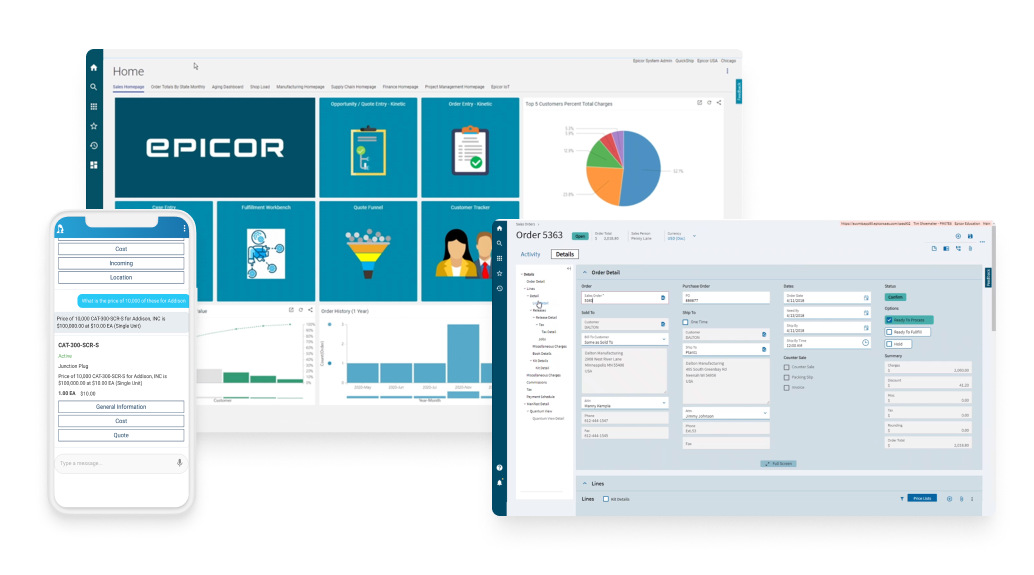
Key features
- Advanced production planning: Structures material requirements, scheduling, and capacity management.
- Customizable dashboards: Displays real-time operational data with industry-specific insights.
- Automated supply chain coordination: Connects procurement, inventory, and vendor collaboration.
- Built-in product configuration: Supports custom manufacturing with dynamic BOM adjustments.
- Seamless multi-site management: Synchronizes operations across multiple production locations.
- Low-code customization framework: Adjusts workflows and modules without deep technical modifications.
Pros and cons
Pros | Cons |
|
|
Best for
Epicor Kinetic serves mid-sized manufacturers handling 50-250 employees. The equipment, electronics, high-tech, or aerospace industries enjoy tight control and streamlining of production, planning, and supply chain flows. Efficient operations without interruption are key benefits of this ERP manufacturing software.
Sage X3
Manufacturing has always been considered a battlefield, where the most important weapons are precision, cost control, and supply chain mastery. A miscalculation will waste materials, disrupt the production process, and drive up costs.

Sage X3 solves these key problems with features built specifically for large-scale, multi-faceted manufacturing. Every module, from inventory tracking to financial integration, works with high precision. It is rated by our team of experts as one of the best ERP software for manufacturing in Malaysia, especially for industrial giants.
Key features
- Advanced work order management: Structures and monitors production sequences with full traceability.
- Multi-site & multi-entity capabilities: Manages operations across multiple locations with unified control.
- Integrated cost & financial tracking: Connects material usage, production costs, and financial reporting.
- Real-time inventory control: Optimizes stock levels to prevent shortages and overproduction.
- Regulatory compliance & quality management: Automates reporting for industry regulations, including traceability in pharmaceuticals and food production.
Pros and cons
Pros | Cons |
|
|
Best for
Sage X3 is the powerhouse for manufacturers operating in regulated, high-volume industries. Malaysian companies manufacturing pharmaceuticals, chemicals, and food products can control compliance, tightly structured costs, and multi-site workflows with this one of the best ERP software for manufacturing.
Infor M3
Precision, scalability, and real-time insights are three core qualities if you want to run your manufacturing business. Infor M3, as a manufacturing ERP software, delivers all three with a cloud based manufacturing ERP software designed for complex, high-volume production environments.
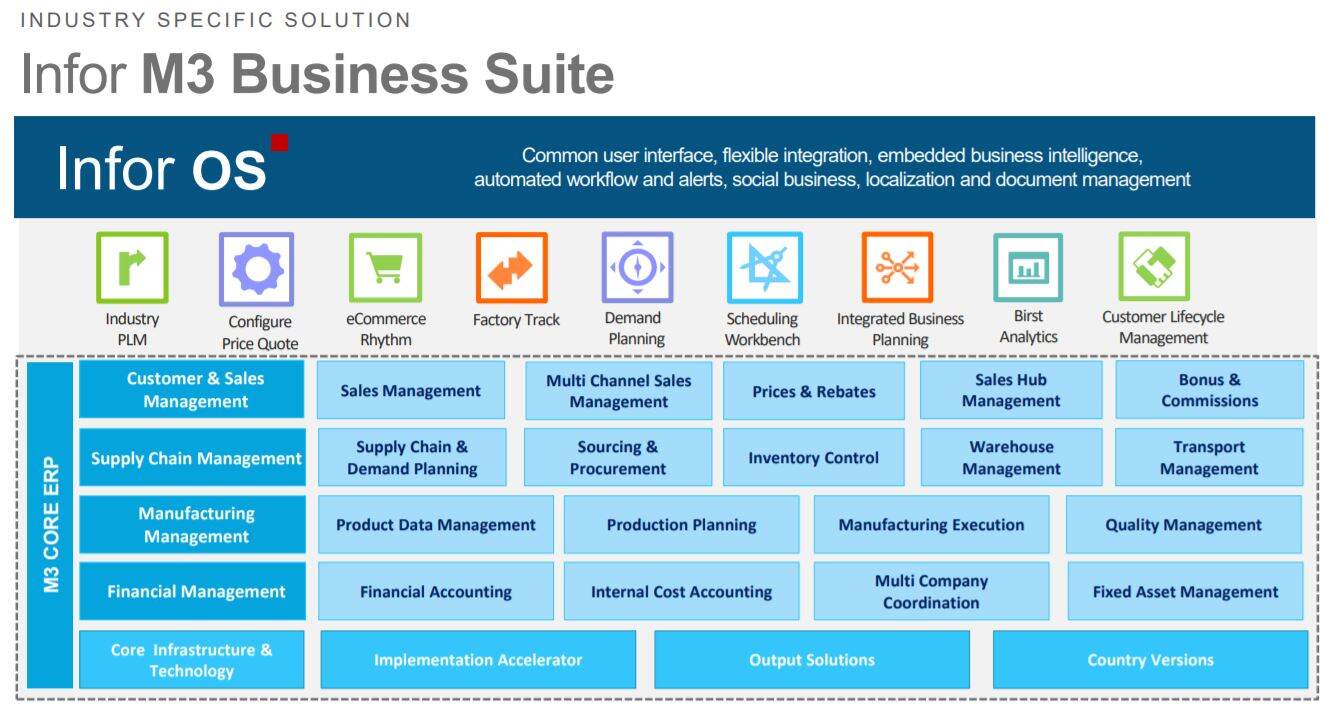
The system controls multi-location operations, synchronizes supply chains, and integrates financial operations with deep analytics. Built for adaptability, Infor M3 customizes each business's unique workflow to suit complex manufacturing needs, supporting both discrete and process production models.
Key features
- End-to-end supply chain synchronization: Manages procurement, logistics, and demand planning with real-time updates.
- Flexible production control: Optimizes batch and discrete manufacturing with advanced scheduling.
- Dynamic inventory tracking: Automates stock movements, reducing material waste and shortages.
- Integrated financial management: Connects cost accounting with production data for real-time margin visibility.
- Industry-specific customization: Adapts workflows for fashion, food and beverage, and industrial manufacturing.
Pros and cons
Pros | Cons |
|
|
Best for
Infor M3 is ideal for mid-sized to large manufacturers managing intricate supply chains and high production volumes. Apparel, food, and industrial sectors benefit from batch production, customization, and compliance-heavy processes. Businesses that value deployment flexibility with industry-specific functionality will get the most value from this ERP software for manufacturing industry’s robust feature set.
SYSPRO
SYSPRO is manufacturing ERP software that fine-tunes every phase, linking planning, execution, and control. Built for both discrete and batch manufacturing, it adapts to complex workflows, aligning materials, costs, and schedules without disruption. Every module integrates seamlessly, delivering operational visibility that accelerates decision-making.
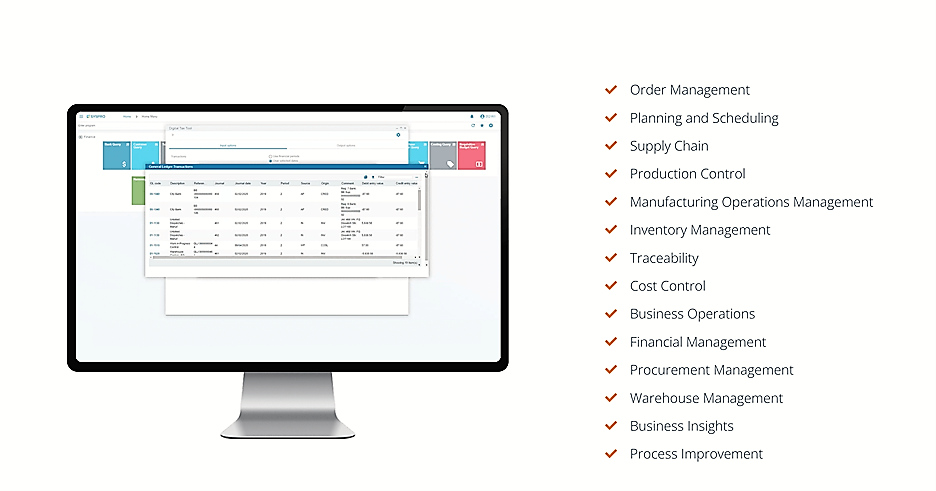
Key features
- Real-time production scheduling: Synchronizes demand, capacity, and resources for optimized throughput.
- Advanced inventory costing: Tracks multi-tier pricing, raw materials, and finished goods valuation.
- Automated reporting framework: Generates detailed financial and operational insights without manual intervention.
- Custom invoice management: Configures detailed invoicing structures aligned with industry requirements.
- Seamless system integration: Connects third-party applications for end-to-end process automation.
Pros and cons
Pros | Cons |
|
|
Best for
SYSPRO fits mid-sized manufacturers needing precise cost control, automated reporting, and deep system connectivity.
HashMicro
In the manufacturing ERP software world in Malaysia, HashMicro serves as a manufacturing ERP with a robust modular structure built for precision. With this ERP software manufacturing, Malaysian manufacturers gain strategic advantage through streamlined workflows, financial management accuracy, and adaptive automation capabilities.
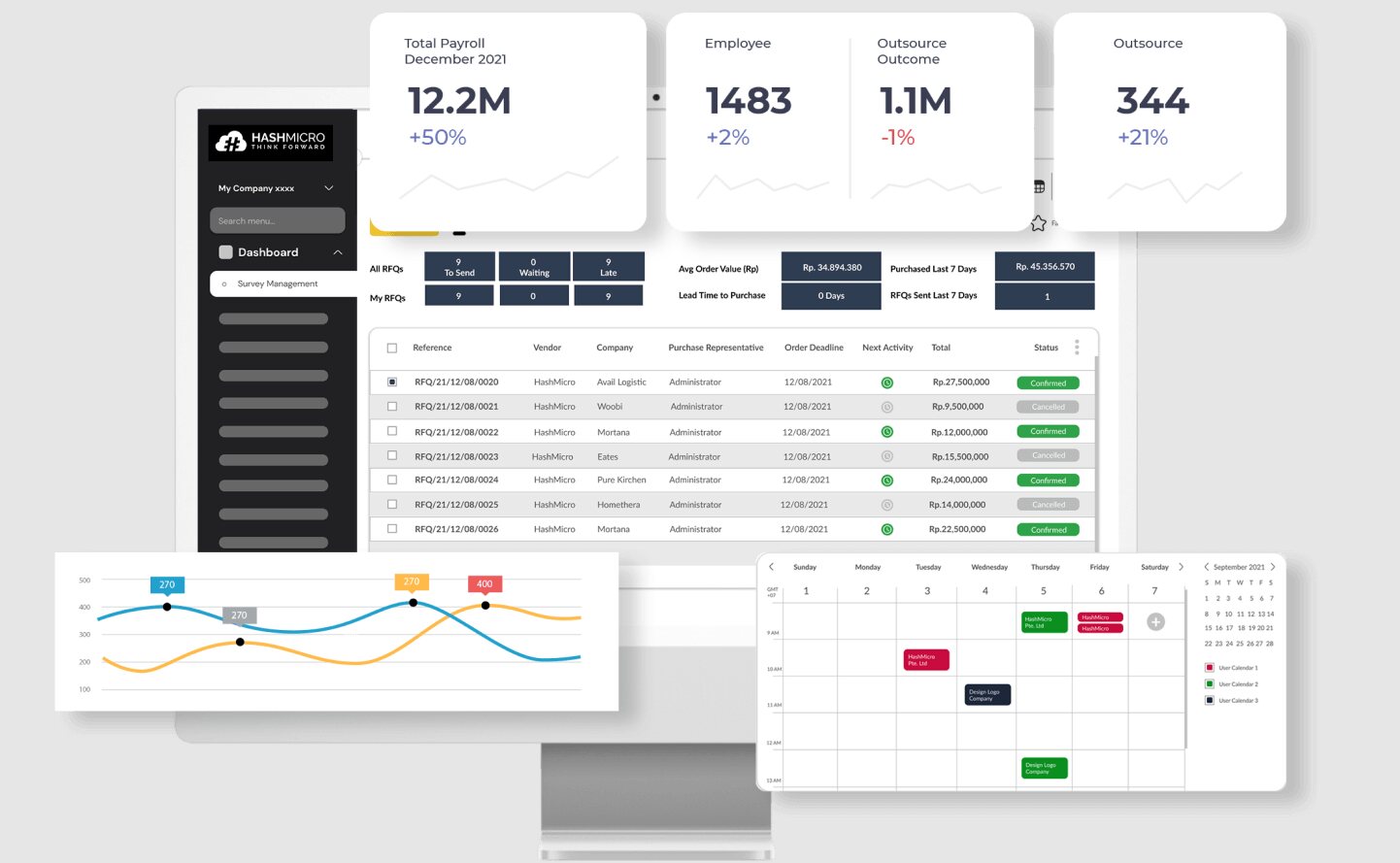
Key features
- Advanced inventory structuring: Tracks stock levels, movement, and raw material usage with precision.
- Dynamic production scheduling: Optimizes resource allocation for uninterrupted manufacturing cycles.
- Multi-tier Bill of Materials: Manages intricate assembly structures for complex product configurations.
- Integrated sales and order management: Links production demand with real-time customer orders.
- Quality control framework: Implements product traceability and compliance across the supply chain.
- Strategic supply chain coordinator: Aligns procurement, vendor relationships, and logistics.
- Data-driven analytics engine: Generates performance insights for rapid decision-making.
- Manufacturing-specific accounting: Automates cost analysis, budgeting, and profitability tracking.
- Custom-tailored ERP modules: Adapts functions to unique business models and operational needs.
Pros and cons
Pros | Cons |
|
|
Best for
HashMicro fits mid-sized to large-scale manufacturers operating in high-variability industries. Enterprises requiring multi-level production tracking, cost intelligence, and sales integration maximize its capabilities.
About Manufacturing ERP Software: Facts Surprise You!
Definition: What is Manufacturing ERP Software?
Manufacturing ERP software organizes manufacturing, inventory, and financial operations of a manufacturing enterprise into an all-in-one integrated system. It facilitates material planning, factory workflow management, and resource utilization with real-time accuracy. Every stage is automated in a structured manner, at every stage from large to small.
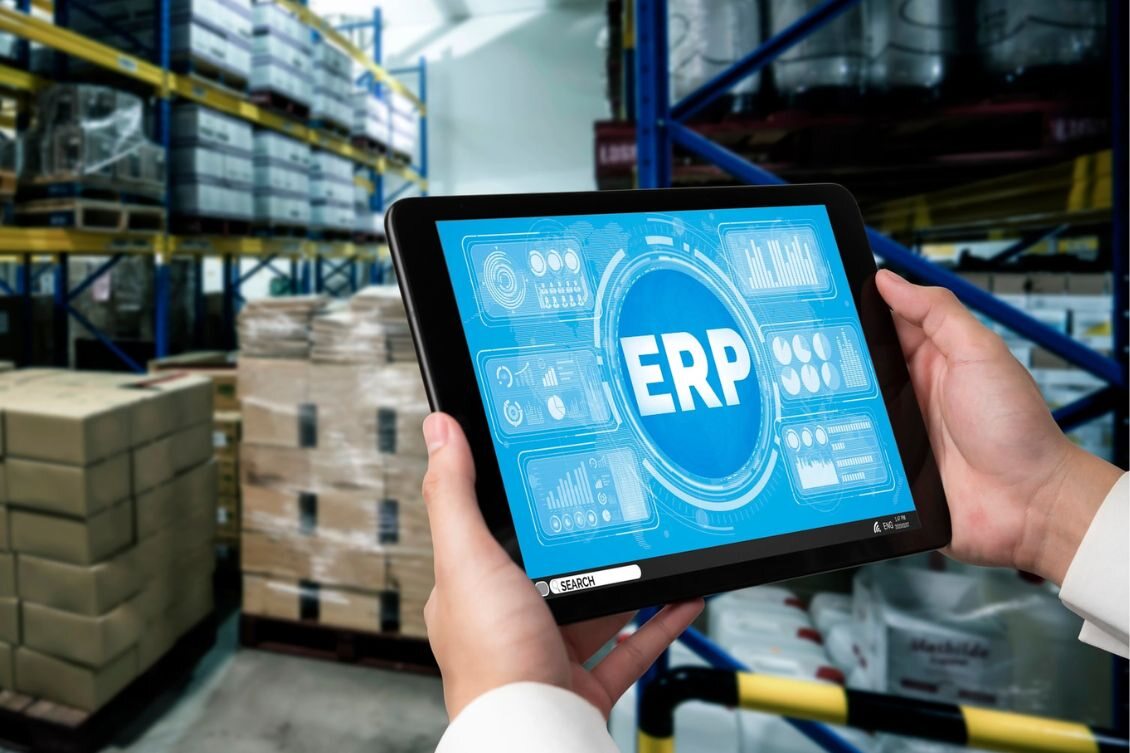
This software eliminates errors or inefficiencies due to manual operations, and further strengthens the continuity of the supply chain. Built for the unique complexity of manufacturing, it handles multi-layered manufacturing processes and cost analysis at scale. The system also directs manufacturing intelligence with predictive insights and operational control.
Benefits of Using Manufacturing ERP Software
The key benefits of manufacturing ERP software are listed below:
- Unbreakable inventory control: Eliminates shortages, stockpiles, and waste with exacting precision.
- Flawless production synchronization: Commands machines, labor, and material flow with pinpoint accuracy.
- Aggressive cost reduction: Identifies financial leaks, eradicates excess, and enforces budget discipline.
- Absolute quality governance: Detects defects, ensures compliance, and locks in product consistency.
- Data-driven tactical advantage: Transforms manufacturing data into predictive power and strategic execution.
- Scalability without limits: Expands with complexity, integrates seamlessly, and dominates market shifts.
Expert Tips for High-Quality Journey of Using Manufacturing ERP Software
For a successful journey with manufacturing ERP, don’t miss the tips from our experts below.
Every business needs its own blueprint
A manufacturing ERP software built for everyone works for no one. Manufacturing, in particular, has many layers, and each factory has a different style and quality of operation. Therefore, your ERP solution should not be set up in a general way, hindering efficiency instead of locking it. Map out every critical workflow before touching the system. If the processes are still unclear, the software will only automate the confusion.
Customization should be precise, not excessive
Flexibility sounds good, of course! But too much customization turns an ERP into a maze. Additional fields, complex approvals, and unnecessary automation will slow down the overall production process instead of speeding it up. Use the software first to understand how it works, and determine how your business really needs to customize it to match the current workflow.
Real-time insights need real accountability
Live dashboards mean nothing if teams don’t trust the numbers. The data entry of the manufacturing ERP software must be rigorous, or decisions will collapse due to incorrect information. Set clear roles for who tracks inventory, updates production statuses, and records machine performance. No data, no decision.
User training is not an afterthought
The success of manufacturing ERP software depends on the people who use it. No matter how well designed a system is, it will fail if employees keep going back to spreadsheets or waiting for a workaround. Training must be hands-on, relevant, and continuous. Every mistake in usage is a risk to production.
Support must be as reliable as the system
When problems hit, waiting hours for support is not a good option. Manufacturing doesn’t pause for software issues. A support team must understand operations, solve issues fast, and never leave businesses stranded. If ERP downtime costs thousands per hour, bad support costs even more.
Final Thoughts
Our article helps you have a more comprehensive view of 10 best manufacturing ERP software in Malaysia, including Odoo, Netsuite, SAP Business One, Microsoft Dynamics 365 Business Central, and more.
In conclusion, manufacturing ERP software should sharpen efficiency, not create obstacles. A system that fits the business, strengthens operations, and delivers real-time control drives competitive advantage instead of delays. The right manufacturing ERP software transforms production into a powerhouse, not a battlefield.
Don’t hesitate to contact A1 Consulting for custom consultation about how to choose and implement Odoo ERP for manufacturing just for your business!
